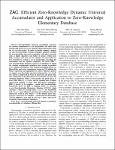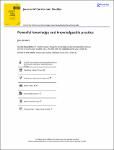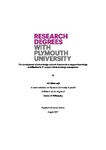Knowledge management competence for ERP implementation success
| dc.contributor.supervisor | Liu, Shaofeng | |
| dc.contributor.author | Jayawickrama, Uchitha | |
| dc.contributor.other | Faculty of Arts, Humanities and Business | en_US |
| dc.date.accessioned | 2015-07-29T13:04:59Z | |
| dc.date.available | 2015-07-29T13:04:59Z | |
| dc.date.issued | 2015 | |
| dc.identifier | 10364029 | en_US |
| dc.identifier.uri | http://hdl.handle.net/10026.1/3498 | |
| dc.description.abstract |
The global business environment has changed dramatically in recent years, as competition in complex knowledge-based economies has increased. Enterprise Resource Planning (ERP) systems have been viewed as a way to manage increased business complexity, leading to the rapid adoption and implementation of such systems, as ERP can support enterprises to improve their competitiveness. Knowledge management (KM) is crucial for ERP systems implementation, however a highly demanding task. Therefore, the primary concern of this research is to examine the effectiveness of knowledge management activities that would contribute to achieve ERP implementation success. This study adopted mixed methods approach by combining semi-structured interviews and a questionnaire to collect empirical data from ERP professionals in both manufacturing and service sector organisations. In the qualitative phase, it develops the “framework of integrative knowledge” based on empirical evidence, that can improve KM competence for ERP implementation success. Data analysis has been undertaken using a combination of thematic analysis and comparative analysis with respect to 14 ERP implementations in the UK. The framework integrates multiple perspectives in terms of knowledge components to enhance KM competence, including knowledge types, knowledge layers, KM lifecycle and knowledge determinants. It discovered 19 knowledge determinants to drive knowledge management activities during ERP projects, which is another vital contribution to the existing knowledge. Furthermore, the study develops the “knowledge network model” for ERP implementations in order to facilitate the knowledge flows between various stakeholders involved in ERP implementations, which can help to understand the interactions between the knowledge components. Moreover, sub-knowledge types (knowledge elements) under each knowledge type were discovered through empirical evidence. The quantitative phase was adopted to extend the findings of the qualitative phase. The knowledge types and knowledge elements were prioritised using Analytic Hierarchy Process (AHP) method through an online AHP based questionnaire with 77 responses from ERP professionals involved in UK ERP implementations. Furthermore, knowledge prioritisation demonstrates how effectively the framework of integrative knowledge can be used during ERP implementations with the help of prioritised knowledge. In total 4 knowledge types and 21 knowledge elements were ranked based on their contribution to achieve ERP success; four variables of information quality, systems quality, individual impact and organisational impact were used to measure ERP success. This study has number of theoretical contributions including framework of integrative knowledge, knowledge network model for ERP implementations and ERP knowledge prioritisation. Moreover, the framework of integrative knowledge can provide ERP practitioners with useful guidance on what the key knowledge determinants are and how the relationships between knowledge components should be best managed to achieve ERP implementation success in business reality. | en_US |
| dc.language.iso | en | en_US |
| dc.publisher | Plymouth University | en_US |
| dc.subject | Enterprise Resource Planning | en_US |
| dc.subject | ERP Implementation | en_US |
| dc.subject | Knowledge Management | en_US |
| dc.subject | KM Competence | en_US |
| dc.subject | Knowledge Integration | en_US |
| dc.subject | Framework of Integrative Knowledge | en_US |
| dc.subject | Knowledge Network Model | en_US |
| dc.subject | Knowledge Prioritisation | en_US |
| dc.subject | ERP system | en_US |
| dc.subject | ERP success | en_US |
| dc.subject | Information Systems | en_US |
| dc.subject | Enterprise System | en_US |
| dc.title | Knowledge management competence for ERP implementation success | en_US |
| dc.type | Thesis | |
| plymouth.version | Full version | en_US |
| dc.identifier.doi | http://dx.doi.org/10.24382/4520 |
Files in this item
This item appears in the following Collection(s)
-
01 Research Theses Main Collection
Research Theses Main





